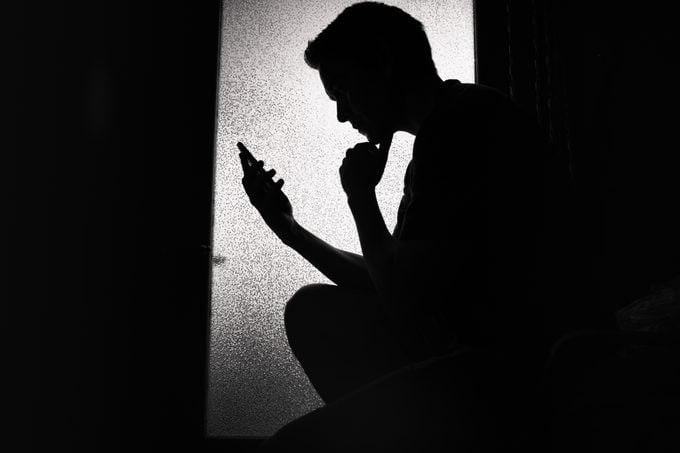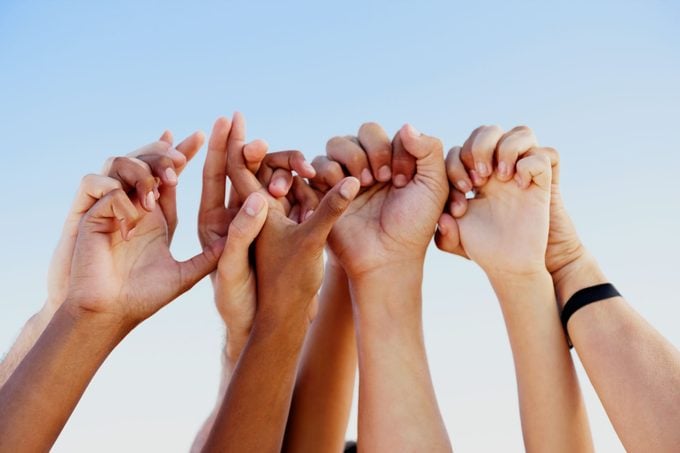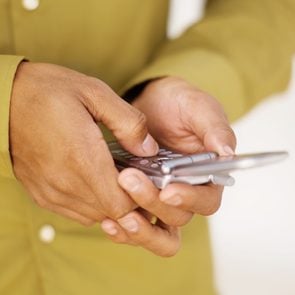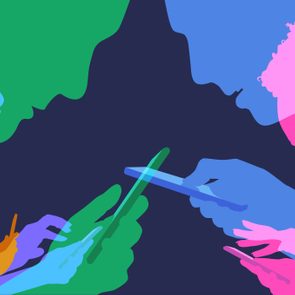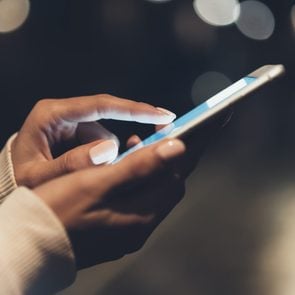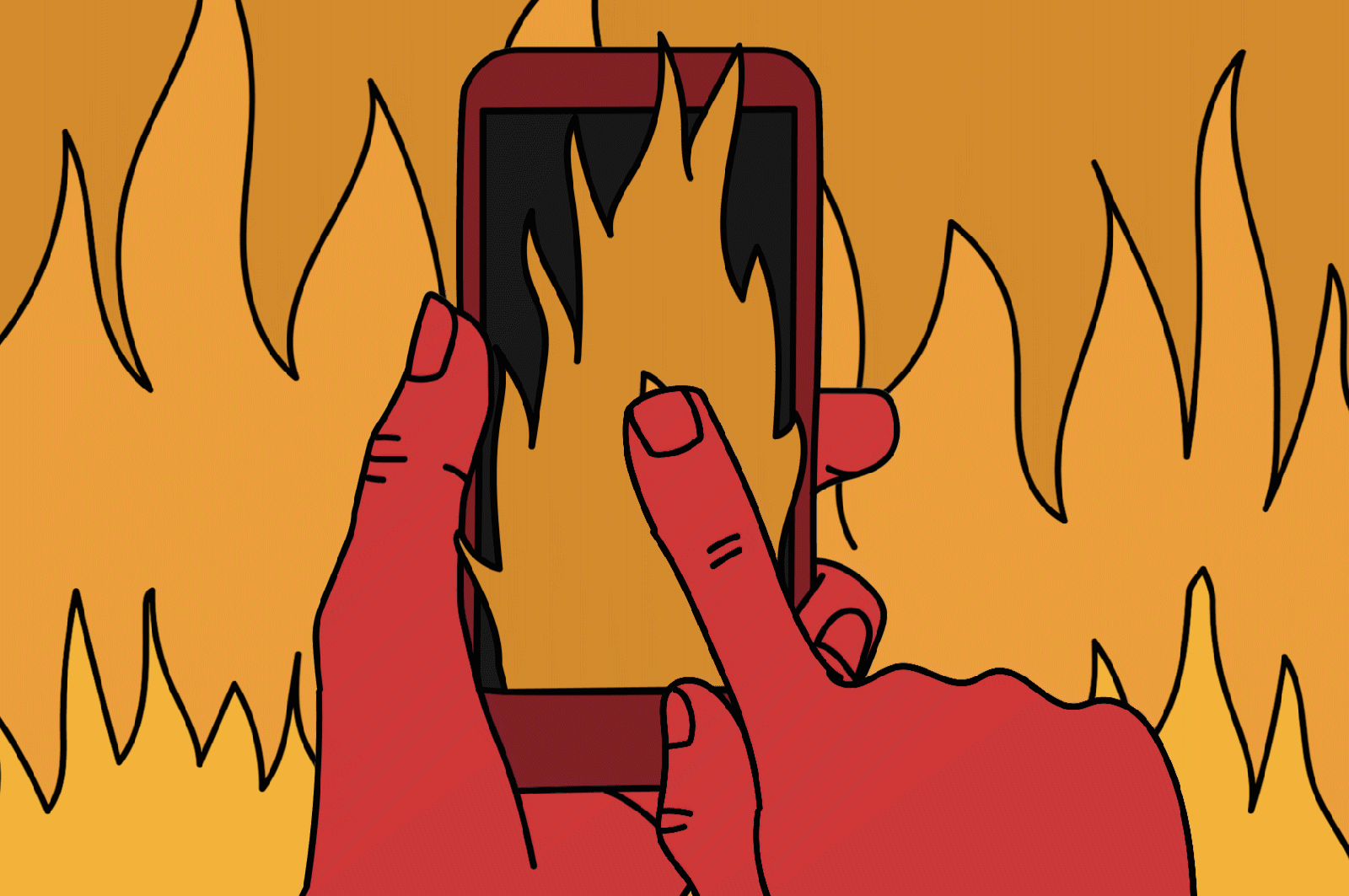I Was Addicted to My Phone—Here’s How I Got Over It
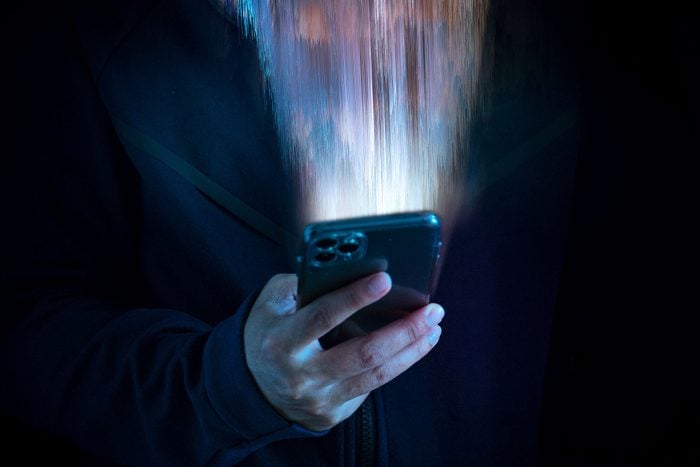
Martin struggled with phone addiction for years before recovery. Now he doesn't fight to limit his time on his phone—he's free from the urge to use it compulsively.
The symptoms of phone addiction can include any behavior that makes you suffer or feel guilt or shame around your phone use. Do you pick up your phone for one reason, then end up scrolling for hours without realizing how much time has passed? Do you regularly set screen-time limits and then blast through them? Do you find yourself doomscrolling, wishing you could stop and feeling powerless to do so? Do you lie about how much time you spend on your phone because you’re too embarrassed to admit the truth? Do you turn to your phone every time you have a free moment, or does your phone use lead you to unprofessional work habits or neglected relationships, work, studies, personal hygiene or nutrition? These can be signs of an unhealthy phone addiction.
You may be wondering how to break a habit that’s so destructive and uncannily powerful. Tricks like habit stacking can help build good habits. And tools like your iPhone’s Do Not Disturb mode can help combat the negative effects of social media on your brain. But sometimes they’re not enough.
In order to break his phone addiction, Martin Torres (whose name has been changed) learned that he had to go much deeper. Along the way, he ended up making recovery possible for countless others by helping found a 12-step fellowship for internet and technology addicts. This is his story.
Get Reader’s Digest’s Read Up newsletter for more tech tips, humor, cleaning, travel and fun facts all week long.
Screen time as salvation
My phone addiction started before I got a phone. From a really young age, screens called to me. I’d always get excited to go to friends’ houses, where there were video games to play and televisions to watch.
Long before I got a cell phone, I got a Game Boy. This was my first handheld device. My mom didn’t allow us to have video games, and we didn’t have a television, but she compromised with the Game Boy. I would stay up late (or hide in the bathroom) just to keep playing it.
As I grew older, my attachment to screens and the rewards they gave me—a sense of wonder, fantasy, adventure, connection and creativity—grew stronger. By the time I turned 11 or 12, I had started to feel more disconnected from my peers. That, combined with some traumatic experiences as a child, some abuse, led me to turn more and more to screens as a coping mechanism.
The picture of phone addiction
I got a flip phone when I was in middle school, but I didn’t get a smartphone until I was 18. I was one of the last of my peers to get one, mostly because I suspected it would not be good for me. (For a long time, I avoided signing up for social media for similar reasons.) I had been struggling with a lot of compulsive activity with my laptop: playing online games, watching videos and procrastinating on homework.
But I remember when I did get a smartphone. Oh wow, I thought. So this is why everyone uses this. I feel so much smarter. I can just look up everything all the time.
And in the first few months of having a smartphone, I felt this huge boost in my productivity, in my intelligence.
But this happened within the context of an ongoing battle against compulsive screen use, which could take me late into the night and way into the morning. I’d even started to stay up all night, either on my phone or on my laptop, just scrolling through social media feeds, playing games and watching videos.
Hitting rock bottom
The first time I ever considered that I might be a phone addict was in 2014. I’d gotten a summer scholarship, a real dream opportunity. I didn’t have any professors, any homework or any parents—I was on my own in a different city. And I couldn’t stop watching YouTube videos on my phone.
One night, probably around 4 or 5 a.m., I had a realization. I’d been sitting hunched on the ground by the wall, using the neighbor’s Wi-Fi because I’d blown through all my data. And I was watching these videos, but I didn’t enjoy them. I didn’t want to be watching them. I thought they were inane and pointless.
I remember watching a video and thinking to myself, Please stop. I’m so tired. I don’t like this. I’m not enjoying it.
And then I watched my hand click on the next video. I felt really scared, like I was a prisoner of my own body.
That was the first time I thought, Could this be what an alcoholic experiences? I wouldn’t be able to stop until I literally passed out. I’d fall asleep watching the video in bed, and I’d wake up a few hours later only to start again. I needed that morning screen time to start my day, just like it was coffee.
Seeking help
That was when I first tried searching online for help. I was living in a big city, and I was sure there would be a group of other screen addicts. But I found nothing.
There was nothing in my city or anywhere in my country. All I could really find were intensive rehab camps in South Korea and China—and a footnote on Wikipedia that said there’s a lot of debate about whether internet addiction is a real thing. I remember thinking, Wow, I’m really messed up.
I had recently started therapy, so I tried to talk to my therapist about it. I don’t think he was well equipped to see this as an addiction. He was more concerned about me being perfectionistic or too hard on myself. He told me that maybe it was OK to relax sometimes and watch some videos, even if it wasn’t the most intellectually meaningful content in the world.
So I felt very alone. And this continued for three or four more years before I found recovery.
The courage to change
I continued to binge and suffer in silence and in secret. I was very high performing, so no one had any idea how much I was using screens. But it was leading me toward tremendous financial instability. I lost one job because of my addiction, and I lost multiple relationships.
I was actively suicidal. I couldn’t stop thinking about taking my life.
I was really trying to stop these different behaviors, and I could go for a period of a few weeks to a month without using screens. But sometimes I could only go for a few hours.
In 2017, I had about two months free from playing any kind of game. Then I had a really bad relapse and missed three nights of sleep. When I came out of that binge, I told myself I was going to take my life if I ever did that again.
And so I searched again for a recovery group. I had looked periodically over the years, but this time, I found a 12-step fellowship for gaming called Gaming Addicts Anonymous. Still, I knew my problem had to do with much more than playing games: It was tied to everything I consumed through a screen.
I met some other members in that program who were also working on their internet and technology addiction, and that’s how Internet and Technology Addicts Anonymous (ITAA), a 12-step fellowship based on Alcoholics Anonymous, began. That was in June 2017, six years ago. My life has changed radically since then.
The impact of community
I’d been trying for so long to control my problem in secret. It turns out, the real key to change is not being alone anymore.
So much has followed from that realization. It’s not actually a phone problem that I have—it’s a phone solution to my shame, my perfectionism, my fear and my depression. Learning to be in a community of other people where I didn’t have to be ashamed of who I really was and what I really struggled with, being compassionately listened to and listening to others, has been tremendous for me.
Part of the process of change was re-evaluating how I thought about my phone addiction. I’d made so many justifications to keep using my phone. There were podcasts and music I needed to listen to all the time to be up to date, I’d tell myself. And while there were some things I could recognize as purely meaningless entertainment, there was this whole other huge area that made it easy to justify my screen time. It was like, Oh yeah, I need to be able to respond as soon as someone texts me. If someone texted me, it would weigh on my soul until I responded. And if it took me more than 30 minutes or an hour to respond, I’d feel really guilty.
My work is primarily through a screen, so it has required me to learn appropriate boundaries, self-awareness and balance. It’s not about being anti-technology; it’s about developing a healthy relationship with technology.
Freedom from bondage
My last online binge was in November 2017. I had a few minor slips over the next two years, but I’ve been continuously sober since the beginning of 2020. That’s across all my devices: my phone, computer and everything else.
Before recovery, I was always trying to stop my phone use. Now, through recovery, I don’t have to stop using the phone because I don’t have the desire to use it. It’s gone. And that was something I never could have imagined.
These days, I just use my phone as needed. I largely use my smartphone like a basic flip phone, making calls and sending texts. I try to do as little on my phone as possible, so I do most of my work from my computer unless I’m in transit and it’s something urgent.
I don’t have any notifications turned on. I check my messages and emails once or twice a day at regular times, and I also give myself permission to take days or weeks to respond.
Sometimes I won’t know where my phone is because I don’t have it on me all the time. I usually don’t have it in my pocket; it’s somewhere in the room or on the desk. I’ve heard of studies saying that some people would rather receive a physical injury than have their phone break or that others believe losing their phone is the most frightening thing they could imagine.
But when I realize that I’ve left my phone at home, I feel happy. I don’t have the sense that I’m tethered to my phone. It’s so much better than I could have possibly imagined.
A life well lived
I really thought my phone addiction was just an annoying little habit in a corner of my life, so it’s hard to describe how free I now feel. I’m not just free from the behavior; so much else in my life has flourished. I could not have imagined the magnitude of change that would come from simply using my phone less often. It’s really been humbling and mind-boggling.
Unlike with other addictions, I can’t overdose on my phone. But it still stole so much of my life. If you strung together all my screen time, I’m sure it would amount to years of 24/7 watching things I don’t even care about. I experienced a tremendous amount of grief about how much I lost and was losing. I’d had all these hopes and dreams but instead spent my time staring at my phone, scrolling.
Today, I never have that thought anymore. I never feel like I’m not living up to my potential. I’m not perfect, but I feel like I’m really doing the best I can and like I’m living my life instead of watching other people live theirs.
Tips for breaking a phone addiction
Currently, ITAA has just over 100 meetings a week. A quarter of those are in person, in cities around the world, including the United States, Europe, Russia, Japan and South America. The rest of our meetings are on Zoom.
The program grew through word of mouth. In the first year, there was just one meeting per week. Then there were two. Then seven. It’s continued to grow, roughly doubling in membership every year.
Through ITAA, I’ve learned some essentials that have aided my recovery. If you’re trying to beat a phone addiction, the tips below are a good place to begin.
Don’t go it alone
Don’t try to beat your screen addiction on your own. It’s the first thing we recommend to newcomers. Come to meetings and see how that feels. Listen to others.
Another thing that’s often helpful for people getting started is making phone calls to other members and looking for a sponsor who has more experience and can help you one-on-one.
Abstain from compulsive behaviors
Because it’s not a primary addiction like alcohol or drugs, where you just stop the activity with the substance, we use a framework that helps us each identify and abstain from the specific behaviors that trigger our addiction, and that looks different for everyone. That’s a process of discovery that we do with other members.
“Bottom lines” are the things that, once we start, we can’t stop, and once we stop, we can’t stay away from. Those are the things we abstain from completely—it’s like our version of alcohol.
For me, it’s any kind of game, watching entertaining online videos, watching movies and television by myself, social media use, any kind of digital erotic content and dating apps. I also generally don’t read the news if I don’t have to.
Know your triggers
“Middle lines” are the things that trigger us or draw us toward our bottom lines. It could be a big deadline, travel or a conflict with someone. But it could also be needing to buy something online, a work email or getting a text from someone who wants you to watch a hilarious video. It could be compulsively checking your text messages or googling random questions.
Focus on your “top lines”
“Top lines” are the things that bring joy and meaning and purpose to our lives. They’re what we replace our addictive behaviors with. They can include going to meetings, calling other members and working the steps. Things like exercising, spending time with the people we love, working on creative projects and things we’re passionate about, taking long walks in nature, resting, napping and staying well hydrated are all top lines.
Find what works for you
In general, the principle that has been most useful for me is that I pretty much only use technology as necessary. I use it as a tool to help me live in alignment with my values, work on things that matter to me and connect to people I love. But I don’t use it for entertainment or curiosity. That’s been a simple but effective guideline for me.
But this process looks different for everyone. For example, some people (like me) can’t play any video games. But other people have never had an addiction to video games, so if their kid wants to play a game with them, it’s a way of being more connected with their family.
Limit temptations
I find it super helpful to turn my notifications off. A lot of people don’t bring their phone to bed or into their bedroom. I and many others don’t check our phones first thing in the morning or last thing at night. We have an offline morning and evening routine.
We practice taking breaks from our devices, turning our phone off and putting it in a drawer and going out for the whole day without the phone—or even taking a whole month off from our smartphone and getting a flip phone instead. I think those things have been helpful for different members who are more on the behavioral end of the spectrum.
Forget the gimmicks
Superficial tricks, like setting your phone to grayscale, using blocker apps or setting a timer, are not super effective in the context of addiction because they reinforce the paradigm of self-control when the key to finding freedom from this is to accept that we don’t have the ability to take control in this area of our lives. So even if you’re just a compulsive user, so to speak, there’s really no harm in joining meetings and listening to others.
Do the work
We also recommend finding a sponsor and working the steps, which is really the core of long-term recovery. Some of the mistakes I made, and others have made, come from being obsessed with stopping the behavior. What we really needed was a much deeper healing process that involves working through our past traumas, being open-minded and open to accepting help from others, and re-learning just how to be in the world so that we don’t need these numbing addictive patterns to survive. And that’s really the difference.
Be open to help
Recovery is a nuanced process, and we encourage people to avail themselves of outside help, whether that’s therapy, support groups or any resources they can draw on to support that. We don’t think of ourselves as the only solution that’s out there.
A lot of people don’t consider 12-step programs because of the spiritual or religious overtones of these programs, so I just want to say that I’m an atheist, and that hasn’t in any way proven a hindrance to my recovery. There is no pressure, dogma or religious affiliation.
A lot of people may not identify as phone addicts. Their phone use might not be a huge source of suffering, shame or loss in their lives. But what I want to say is that no one should have to suffer because of their phone. There are enough reasons to suffer in the world already.
And when it comes to phone addiction, there is hope.
*Name has been changed.
Source:
- Internet and Technology Addicts Anonymous: “Join a Meeting”
